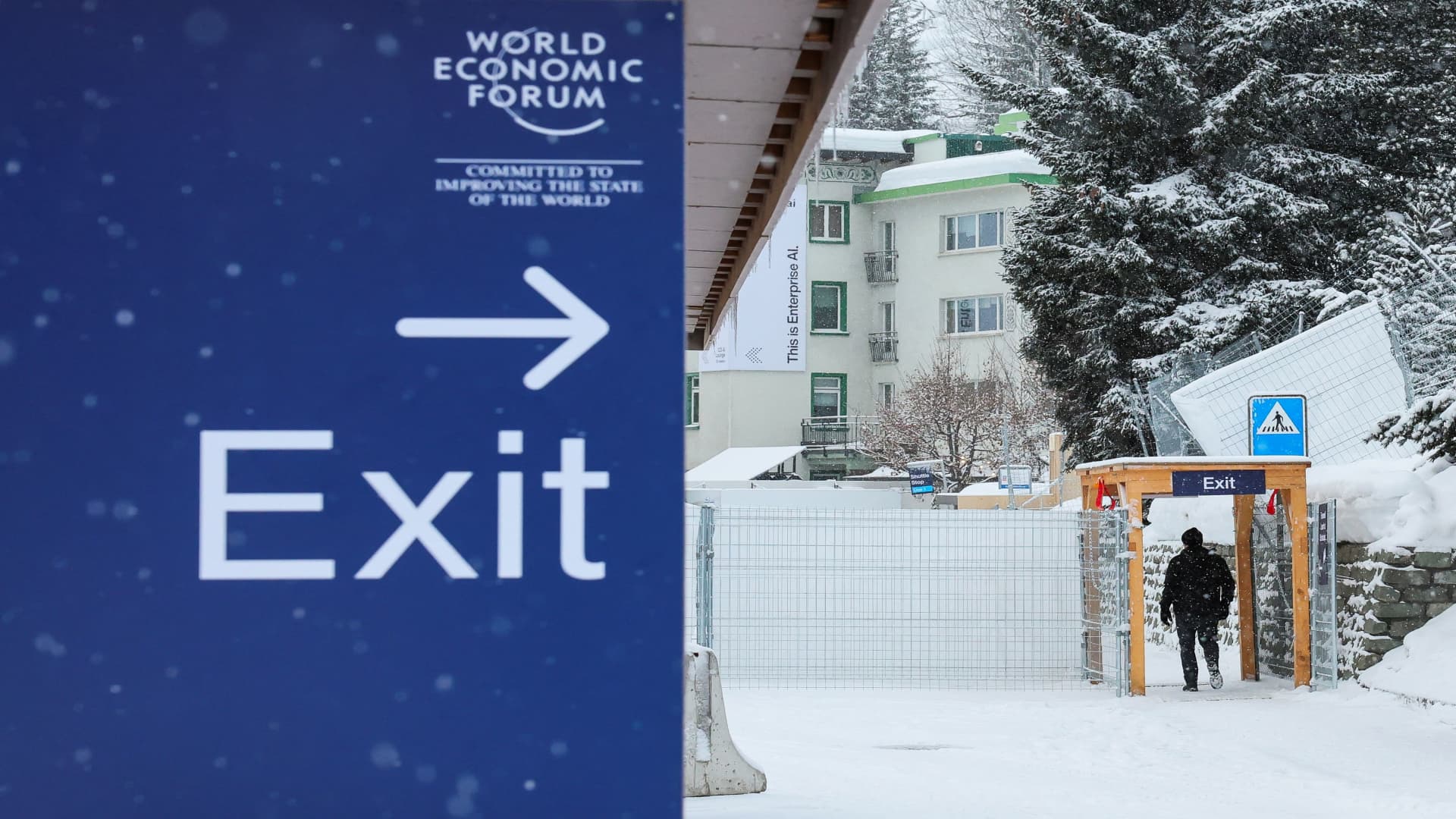A person walks on the day of the 54th annual meeting of the World Economic Forum, in Davos, Switzerland, January 19, 2024. REUTERS/Denis BalibouseDeni
A person walks on the day of the 54th annual meeting of the World Economic Forum, in Davos, Switzerland, January 19, 2024. REUTERS/Denis Balibouse
Denis Balibouse | Reuters
The 2024 World Economic Forum in Davos, Switzerland will wrap Friday. Billionaires and world leaders are flying home from Zurich or taking long weekends to ski in the Swiss Alps.
Conversations at the annual gathering echoed the topics buzzing in the corporate world, from the promise or drawbacks of AI to the political risks clouding the global economy.
Here are some of takeaways from Davos after our week talking to business leaders and government officials at the conference.
Experts see no U.S. recession in 2024
Overwhelmingly, economic experts and executives privately said they don’t expect a U.S. recession in 2024. The Fed’s potential interest rate cuts in the coming months, combined with rising consumer confidence, have led to optimism about the health of the economy – barring another major geopolitical crisis.
Little talk about Israel-Hamas
Given its global importance, the Middle East crisis came up surprisingly little in breakout panels or at planned corporate events at Davos. Perhaps there are few obvious solutions, or maybe – as multiple conference attendees suggested – many people don’t want to speak out on the conflict in Gaza because they could irritate others or start a rhetorical conflagration.
Others gave this as a possible reason why so few U.S. executives – even privately — spoke up on the potential dangers of another Donald Trump presidency. Staying cautious may not be courageous, but it’s just better for business.
Several people pointed out the notable absence of conversations about the rise of global antisemitism at the conference, as Andrew Ross Sorkin noted in The New York Times.
Goodbye crypto, hello AI
Wipro Ltd’s slogan related to Artificial Intelligence (AI) is displayed on a wall during the 54th annual meeting of the World Economic Forum in Davos, Switzerland, January 16, 2024.
Denis Balibouse | Reuters
Last year at Davos, crypto discussion dominated panels. This year, AI took over as the cool kid on the block.
Up and down the Promenade, the main street in Davos, a swathe of companies were advertising their AI wares. Technology leaders, banking executives and even musicians including Wyclef Jean and Will.i.am waxed poetic on the promise of AI. Willi.i.am even pitched his coming SiriusXM radio show featuring an AI co-host.
AI won’t kill us
Speaking of AI, the tone of panel discussions and cocktail conversations about the technology was decidedly optimistic rather than dystopian. Even OpenAI CEO Sam Altman, who had previously joined a chorus of voices warning AI could lead to human extinction, said during the week that AI will “change the world much less than we all think.”
Altman was referring to artificial general intelligence, or AGI. This is technology broadly defined as an AI system that can carry out tasks to the same level as, or better than, humans.
After a big year for labor unions, this may calm the nerves of workers. About 20% of all job postings are considered “highly exposed” to AGI, according to the hiring platform Indeed.com.
Even after AI took massive steps forward in recent years, job listings remain above pre-pandemic levels in most nations, according to Recruit Holdings, the parent company of Indeed and company review site Glassdoor. Altman said his thoughts on AGI have shifted: where he once thought robots will replace us all, he is now impressed by how companies are using it as a tool to supplement human work.
China fighting for cash
China’s Premier Li Qiang speaks during the 54th annual meeting of the World Economic Forum in Davos, Switzerland, January 16, 2024.
Denis Balibouse | Reuters
Chinese Premier Li Qiang told a Davos crowd Wednesday that China’s GDP grew 5.2% in 2023 — slower than its pre-pandemic growth. The country is fighting semiconductor trade war with the U.S., it’s losing foreign direct investment and India just overtook it in terms of population. There are real concerns in China about how to prop up growth as the U.S. looks to isolate Beijing.
That may have prompted Li to reveal the figure publicly to an international crowd looking for investment opportunities, said Ian Bremmer, president and founder of Eurasia Group, in an interview.
“China is experiencing very significant structural economic challenges,” Bremmer said. “A lot of companies in the West are no longer investing what they used to invest, and they’re certainly not thinking about their growth strategies the way they have.”
“But even 3%, 4% growth in China is still fairly meaningful for a lot of companies that are attending the World Economic Forum this year,” Bremmer added. “I think what’s interesting about China’s reduced growth is the fact that it is not just a six-month blip. This is a sustained challenge, and it’s making the Chinese feel like they need to actually reach out much more constructively to the private sector.”
Davos is still popular — creating headaches
Several longtime Davos attendees commented on how the city’s infrastructure can barely contain the popular conference anymore. Shuttles and Ubers to ferry people from place to place were bumper-to-bumper at all hours of each day. The demand for hotel rooms is so high that the price exceeds the accepted expense threshold for Swiss government officials.
They also noted that they spent far less time in the Congress Center — the main event space — than in years past because of all the satellite events that happen around the World Econonic Forum.
Perhaps generative AI can start making some new roads and accommodations for the increased traffic.
www.cnbc.com

COMMENTS